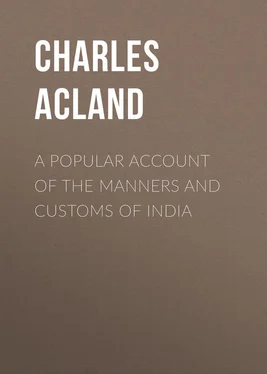Charles Acland - A Popular Account of the Manners and Customs of India
Здесь есть возможность читать онлайн «Charles Acland - A Popular Account of the Manners and Customs of India» — ознакомительный отрывок электронной книги совершенно бесплатно, а после прочтения отрывка купить полную версию. В некоторых случаях можно слушать аудио, скачать через торрент в формате fb2 и присутствует краткое содержание. Жанр: foreign_antique, foreign_prose, Путешествия и география, на английском языке. Описание произведения, (предисловие) а так же отзывы посетителей доступны на портале библиотеки ЛибКат.
- Название:A Popular Account of the Manners and Customs of India
- Автор:
- Жанр:
- Год:неизвестен
- ISBN:нет данных
- Рейтинг книги:5 / 5. Голосов: 1
-
Избранное:Добавить в избранное
- Отзывы:
-
Ваша оценка:
- 100
- 1
- 2
- 3
- 4
- 5
A Popular Account of the Manners and Customs of India: краткое содержание, описание и аннотация
Предлагаем к чтению аннотацию, описание, краткое содержание или предисловие (зависит от того, что написал сам автор книги «A Popular Account of the Manners and Customs of India»). Если вы не нашли необходимую информацию о книге — напишите в комментариях, мы постараемся отыскать её.
A Popular Account of the Manners and Customs of India — читать онлайн ознакомительный отрывок
Ниже представлен текст книги, разбитый по страницам. Система сохранения места последней прочитанной страницы, позволяет с удобством читать онлайн бесплатно книгу «A Popular Account of the Manners and Customs of India», без необходимости каждый раз заново искать на чём Вы остановились. Поставьте закладку, и сможете в любой момент перейти на страницу, на которой закончили чтение.
Интервал:
Закладка:
Charles Acland
A Popular Account of the Manners and Customs of India
PREFACE
The author of the present work was a clergyman, who, along with his wife, quitted England about the beginning of the year 1842, leaving behind him several young children, to whom, as appears from the letters he constantly addressed to them, he was most affectionately attached.
They left the country full of hope that they should all be reunited at some future period; but, before he had been three years exposed to the climate of India, he fell a victim to it. It is somewhat melancholy to find him at the outset rejoicing in the very circumstance which in some measure perhaps occasioned his death. The first destination selected for him was little in accordance with his own taste; and when it subsequently was altered from Assam to Cuttack, he expresses himself delighted with the change, though the first-named province was much more remarkable for its healthfulness than that to which he at length proceeded.
Mr. Acland felt the warmest interest in the education of his children, and, to improve their minds, determined, on quitting England, to send home, from time to time, accurate accounts of his progress, that they might be made acquainted with all he beheld – the places through which he passed, the aspect of the country, its climate, productions, flowers, trees, shrubs, and wild animals. Many an interesting adventure is related in these pages which the author met with in the jungle; the beating of which by the hunting parties, who go forth in bands for that purpose, is described with an animation calculated to awaken much interest.
The letters addressed by Mr. Acland to his children have now been thrown into the form of a Journal, as this method was considered best suited to the general reader. The Editor has, however, been careful to preserve throughout the easy familiar style in which the father first wrote them, that to the children of others they may be equally acceptable and useful.
The books hitherto published on India have been in general, from their bulk, confined to persons arrived at a more advanced period of life; and the Editor of the present volume hopes in some measure to familiarise the subject by bringing it down nearer the comprehension of the youthful reader. This work is intended to describe Indian manners in an interesting way, and will in some measure, it is hoped, supply a portion of the want that has long existed in our literature in this respect. To render the subject more attractive, Mr. Acland was careful to introduce anecdotes and short narratives throughout, which are calculated to amuse, while instruction is at the same time conveyed.
One distinguishing feature may be observed in the whole – viz. a fervent spirit of devotion, which breathes through every page of the original manuscript. Such passages the Editor has thought it better to omit, as the advice from a father to his children, clothed in the simple language he considered it best to employ, though beautiful and touching in itself, would scarcely appear interesting to the general reader. For this reason the substance of his counsel has been compressed into the present brief Preface.
He impresses upon his children the necessity of living ever in brotherly love, of sustaining and comforting one another, and of seeking the Divine aid in every emergency of life, whether great or small. He shows them how, by trusting implicitly in God and acting according to His commandments, they will attain a peace of mind above all the happiness which an indulgence in the pleasures of this life can bestow. He explains to them, in the gentlest terms, how necessary it is for their welfare here and hereafter that they should act ever in accordance with the expressed wishes of the Almighty; and that they must never cease to remember that He moves about them everywhere, and sees their every action, hears each passionate word, beholds each unbecoming gesture, and will reward or punish according as they indulge in or abstain from evil. In several beautiful passages he portrays the unceasing watchfulness of the Almighty in providing for our daily wants, in supplying us with every necessary of life; and inquires, with truth, Ought not every little heart to be daily grateful to Him, without whose will the sun cannot shine, or rise, or set; without whose will the refreshing showers could not force and raise up around us the beautiful and necessary things of life? Then he inquires, How can we better show our gratitude for these blessings than by acting in accordance with the wishes of Him who is the cause of so much good?
These words were spoken by a father to his own children; but I would ask those of my young friends into whose hands this little volume may fall, does it not equally touch them? Do they not feel the truth of these sentences? Coming over the many thousand miles which stretch between India and this country, these letters were cherished the more by the three little children to whom they were addressed; and now that the hand is cold which traced the lines, how much more will they be prized!
Whatever may be the fate of the volume with the public, to those whom it more intimately concerns it will be a lasting remembrance of their father, and of the melancholy circumstances connected with his early death. For their sake, the Editor trusts that the present work may meet with at least a moderate share of success; and that, in the endeavour to render more familiar to the youthful mind the names and habits of some of the inhabitants of India, he may not altogether fail.
London, Sept. 1847.
Madras, June, 1842
We quitted England in the course of March, 1842, and reached Madras in the month of June of the same year. I shall give but a brief sketch of our voyage.
Soon after leaving England, having arrived near Ushant, situated on the north-west coast of France, a tremendous storm came on; the waves rose high and washed the deck, while the ship itself pitched to such a degree that the very dinner rolled off the table; in the night my wife was tossed out of bed, and thrown to the other side of the cabin. We were in the greatest danger of being drowned. I started out of my hammock, but was unable to stand upright. Towards morning, however, the wind abated.
After this storm had passed, the ship went forward rapidly until we reached the equator, where she lay becalmed for several days. The heat at this point of our voyage was excessive; we used to lie about on the deck almost all night, taking care, however, to cover our faces if the moon was shining; for it is said that, in these hot climates, if any one goes to sleep under its light, he is in danger of losing his sight, and even his life. 1 1 It is doubted whether the injury does not rather arise from the damp night-air than from the effect of the moon-beams.
We now proceeded more slowly until we had rounded the Cape of Good Hope, where another storm came on. Every sail was taken in; yet, without their assistance, we ran, in two days, 545 miles. The waves rose as high as mountains, and the ship seemed to toil up one side, and to send the bowsprit up into the air, then, plunging down again, seemed to bury it in the sea. I was standing with my wife at the door of the dinner cabin when a large wave burst in through the upper part of the ship, flooded the room, and shivered one of our large boats to atoms.
As we were passing the equator, too, we suffered from a tremendous thunderstorm. The heat was excessive: not a breath of wind stirred the air. About twelve o'clock a little cloud, about the size of a man's hand, rose in the horizon: gradually it spread until it hung like a huge black mass over the ship. I stood and watched its increase, when suddenly a vivid flash of lightning shot from the heavens, and almost blinded me. At the same moment a crash of thunder bellowed round the ship like the noise of a thousand cannons. The lightning slightly struck one of our passengers and the mate, but did not inflict any serious injury. The rain now descended: not a sharp thick shower, such as you may witness in England, but as it were all in one mass, and soon every trace of the storm passed away; the sun burst forth, and the ship and sails were dried in the course of a few minutes.
Читать дальшеИнтервал:
Закладка:
Похожие книги на «A Popular Account of the Manners and Customs of India»
Представляем Вашему вниманию похожие книги на «A Popular Account of the Manners and Customs of India» списком для выбора. Мы отобрали схожую по названию и смыслу литературу в надежде предоставить читателям больше вариантов отыскать новые, интересные, ещё непрочитанные произведения.
Обсуждение, отзывы о книге «A Popular Account of the Manners and Customs of India» и просто собственные мнения читателей. Оставьте ваши комментарии, напишите, что Вы думаете о произведении, его смысле или главных героях. Укажите что конкретно понравилось, а что нет, и почему Вы так считаете.












